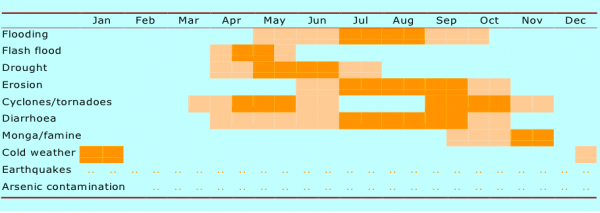 Over the years Bangladesh has become seasoned in environmental management. However, enforcement of legislations across levels is lacking where attention must be paid. Mohammad Tarikul Islam highlights the underlying challenges ahead for environmental governance in Bangladesh, and where solutions might be found.
Over the years Bangladesh has become seasoned in environmental management. However, enforcement of legislations across levels is lacking where attention must be paid. Mohammad Tarikul Islam highlights the underlying challenges ahead for environmental governance in Bangladesh, and where solutions might be found.
Environmental governance is a concept in political ecology or environmental policy related to identifying the elements needed to achieve sustainability and resilience. It is entwined with different aspects of sustainable development and is crucial not only to the well-being of the people but also for their very survival, particularly for those who depend on natural resources and the environment to manage livelihood. A large number of social, economic, and political conflicts and issues are also linked to environmental resources. Environmental governance, well-thought-out as the expanded management of policies engaging social and environmental actors, intends to meet this crisis by combining the experience and knowledge of relevant social agents and institutions.
The milieu of environmental management in Bangladesh
Bangladesh is recognised to be one of the most ecologically vulnerable countries in the world, highly vulnerable to climate change as a result of its unique geographic location, hydro-geological characteristics like dominance of floodplains, low elevation from the sea and lastly the socio-economical characters like high population density, high levels of poverty, and overwhelming dependence on nature. The physical environment of Bangladesh is diverse, and there is a mix of both traditional and modern methods of land use, all very closely adapted to the heterogeneous conditions. This complexity of environment and utilization patterns has important implications for the vulnerability and depletion of the natural resource base. The high population density, low economic growth, lack of institutional infrastructure, an intensive dependence on agriculture and agricultural products, geographical settings, and various other factors, all contribute to make the country weak in its economic development and quality of life. Figure 1 & 2 below illustrates the disaster vulnerability of Bangladesh since it became an independent nation in 1971.

Figure-1: Disaster and climate profile of Bangladesh (UNDP Bangladesh, 2012)

Figure-2: Disaster calendar of Bangladesh (World Food Programme, 2011)
In line with the Stockholm mandate 1972, the government of Bangladesh actively participated in the generic process of protecting global environment. In order to put the Stockholm mandate into effect, the Bangladesh government had promulgated the first Water Pollution Control Ordinance in 1973 as well as the Environment Pollution Control Ordinance in 1977. To carry out the environmental programme on ground, In 1985 Department of Pollution Control Ordinance was established and it has been renamed and structured as Department of Environment (DOE) afterward.
The idea of environmental protection through national efforts was first recognised and declared with the adoption of the Environmental Policy 1992. While formulating environmental policy, different actors and factors played some direct and indirect roles. All the actors, whether external or internal, played pertinent roles in the formulation of the environmental policy. In the context of the environment, the Government of Bangladesh formulated an Environment Policy in 1992. Key elements of the environment policy are maintenance of the ecological balance and overall progress and development of the country through protection and improvement of the environment; protection of the country against natural disasters; identification and regulation of all types of activities which pollute and degrade the environment.
The Government of Bangladesh has recognized climate change as an important issue and attempts are being made to incorporate potential response measures for reducing impacts of climate change into overall development planning process. It is being increasingly recognized that the adverse impacts of climate change in an already vulnerable country such as Bangladesh will put additional stress on overall development of the country. The National Adaptation Programme of Action (NAPA) is prepared by the Ministry of Environment and Forest (MOEF), Government of the People’s Republic of Bangladesh in 2005 as a response to the decision of the Seventh Session of the Conference of the Parties (COP7) of the United Nations Framework Convention on Climate Change (UNFCCC). The basic approach to NAPA preparation was along with the sustainable development goals and objectives of the country where it has recognized necessity of addressing environmental issue and natural resource management with the participation of stakeholders in bargaining over resource use, allocation and distribution. Besides, to meet the threat of climate change by undertaking adaptation measures through utilization of internal and external resources, Bangladesh launched a Bangladesh Climate Change Strategy and Action Plan in 2009.
Formal responsibilities of overall environment sector are vested with the Ministry of Environment and Forest (MoEF). However, many other institutions, directly and indirectly, are involved in managing or shaping the environment sector. These embrace public sector, private sector and civil society institutions. The MoEF bears the responsibility for working with other ministries to ensure that environmental concerns are given due recognition in their development program. The Ministry has an active role to play in policy advice and coordination of the implementation of action plans across all sectors. MoEF is also responsible for reviewing and monitoring the impact of development initiatives on the environment across all sectors. Department of Environment (DoE), one of the dedicated wings of MoEF is entrusted with the responsibilities of implementing environmental programme on ground. Besides, other ministries of the government are tangled with a basis for addressing fundamental issues of environmental management in Bangladesh.
Challenges to environmental governance
Bangladesh’s top-down decision-making system, however, has its diffuseness as the central government makes decisions while local government and administration implement policies. The overall decision-making process is suffering from a dearth of feedback process from the lower to upper-levels, resulting in inadequate reflection of the actual ground-level situation in policies and systems. On the other hand, the decision-making process provides no adequate channels for communication among decision-makers, the public, relevant actors (civil society members and non-state actors) and the media. As a result, non-state actors show less interest in undertaking initiatives in responding to policies, and the community for whom environmental protection programmes are designed does not play a positive role in participation that limit the effectiveness of implementation, to a great extent.
Existing environmental policy guidelines don’t offer operative apparatuses to deal with climatic change; even environment policy did not mention explicitly the term climate change and its adverse impacts. Formal or informal dialogues between governmental agencies particularly MoEF and DoE as well as polluters are not witnessed in the process of environmental policy implementation in Bangladesh. Institutional capacity of the concerned ministries for implementing the various action measures is not passable. Conversely, neither the fledgling MoEF nor DoE has developed the institutional capacity to extensively fight problems of environmental management and protection. Inadequacy in transparency and public consultation at decision-making process resulting in weakness of MoEF and DoE to care for environmental governance. In addition, there are a number of underlying causes which are apparently liable for poor environmental governance in Bangladesh, including a lack of institutional capabilities, untrained human resources, a lack of awareness, low community participation in resource management, and a paucity of research and lack of coordination among different stakeholders (governments, UN agencies, NGOs, private sector and civil society).
The way forward
To guarantee the achievability of all national policies relevant to environment, MoEF and DoE should adopt mitigation and adaptation process to build up central database and management information system (MIS). Existing environmental policy needs to be reformed with the climatic vulnerability considerations. Clear policy direction is essential to solve the trans-boundary water issues with India accelerating bilateral negotiations as well as uplifting the Joint River Commission. It is important to launch community awareness and information dissemination in order to have the stakeholders involved and concerned. These campaigns would also give the opportunity to understand what the perception and views of the public on environment, climate change and adaptation are.
Changes in institutional, administrative and organisational arrangements would be necessary to enhance the effectiveness of political decisions. This would be preceded by an examination of the existing bodies in charge of climate change issues: national climate change committees, their degree of representativeness and corresponding power and functions. Better coordination/integration of the different sectoral departments would be encouraged and institutionalised to render the services aiming at attaining governance for environmental protection. Efforts to be directed to find out possible way forward to ensure accountability and efficiency of the local government managing natural resources and environment.
Relevant stakeholders should also play a major role to streamline the environmental governance by the way of Information collection and dissemination; Policy development consultation; Policy implementation; Assessment and monitoring; and Advocacy for environmental justice. We should bear in mind that, NGOs and other civil society groups are not only stakeholders in governance, but also a driving force behind greater international cooperation through the active mobilisation of public support for international agreements. Due to their critical role in service delivery and implementation, civil society organisations have long been recognised as “partners” of the UN system, especially in environmental negotiations. Above all, the United Nations system, including international finance and development agencies, and all intergovernmental organisations and forums, should in consultation with non-governmental organisations, complement the efforts of the government of Bangladesh to accelerate the enforcement of legislations pertaining to environmental governance.
This article gives the views of the author, and not the position of the South Asia @ LSE blog, nor of the London School of Economics. Please read our comments policy before posting.
Cover image: a fishing boat in Bangladesh. Photo credit: Adnan Islam, Flickr, CC BY 2.0.
About the Author
 Mohammad Tarikul Islam is a former UN Development Practitioner, and Assistant Professor of Government and Politics at Jahangirnagar University in Bangladesh and Visiting Research Fellow at the University of Oxford. He can be reached at t.islam@juniv.edu
Mohammad Tarikul Islam is a former UN Development Practitioner, and Assistant Professor of Government and Politics at Jahangirnagar University in Bangladesh and Visiting Research Fellow at the University of Oxford. He can be reached at t.islam@juniv.edu







